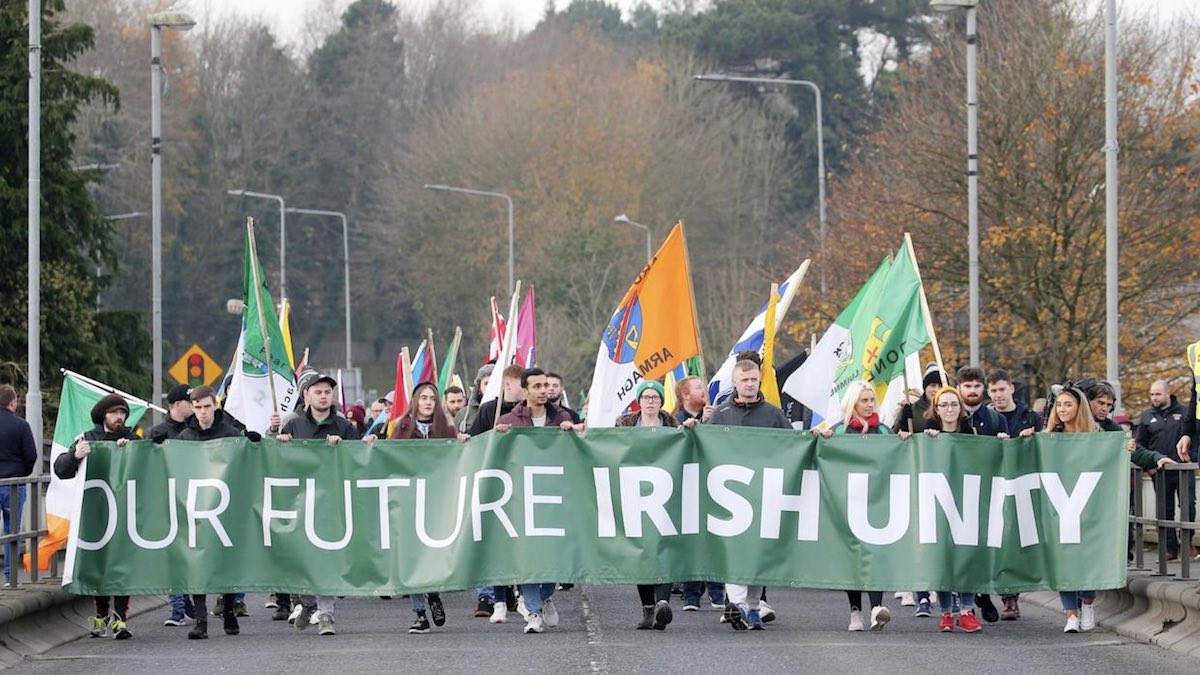
Support for the North of Ireland remaining in a Union with Britain has dropped below the key 50% level for the first time in a state-funded survey of the Six Counties, adding to pressure for an end to partition and the complete decolonisation of the island of Ireland.
The proportion of people who support British rule in the North of Ireland has fallen by more than ten percentage points over the past decade, and by almost five points since 2019, according to the survey, carried out by the British government’s own Economic and Social Research Council.
According to the ESRC researchers, the percentage of people wishing to remain under British rule is now 48.6%, a drop of 4.9% compared to the corresponding survey in 2019 and the first time this survey has put this figure at less than half of voters.
It is a 10.5% drop off in support for the union since 2015, when the figures was at 59.1%.
It also shows support for Irish unity at 33.7%, an increase of more than five percentage points over the past five years. Undecided voters and others were put at 17.7%.
Other polls have shown similar increases in support for Irish unity. Sinn Féin MP Dáire Hughes said the latest survey “speaks to the growing desire for a new and better future where decisions are taken at home on the island of Ireland”.
The Newry and Armagh MP said there is an “ongoing and vibrant discussion” taking place across our island and at every level of society.
“Increasingly, people are demanding that decisions about their lives and their futures be taken here at home, on the island of Ireland.
“With a General Election just around the corner, the incoming Irish government must make planning and preparation for constitutional change a priority.”
He added: “It is now incumbent on both governments to begin preparations and to work together to enable communities across our island to realise the potential of a new and better future.”
The process of British decolonisation around the world has returned to prominence recently with the decision of the British government to accept a series of legal judgements and return to Mauritius all but one of the islands of the Chagos Archipelago, previously referred to as the ‘British Indian Ocean Territory’.
Global pressure on England to resolve its colonial legacy is also currently visible in the ongoing tour of former British possessions by England’s King Charles.
The monarch, who became Australia’s head of state following the death of his mother two years ago, was heckled and linked to the genocide of indigenous Australians as he addressed Australia’s Parliament House last week.
Lidia Thorpe, an Aboriginal Australian woman and Senator, accused the British Crown of a range of crimes at the Australian parliament in Canberra as she told him: “This is not your land, you are not my King.”
Recent polls show strong Australian public support for ending the reign of the Windsor family as the monarchs of Australia, and for the nation to become a republic. Australia became self-governing in 1901 and gained full independence in 1986.
Plans are also currently being made worldwide for the USA to celebrate the 250th anniversary of its freedom from British rule in two years time. Events will take place in both parts of Ireland to mark July 4 2026, including in the Six Counties.
The events in the North, to include a programme of lectures, talks, conferences, and exhibitions, were announced this week – ironically by hardline unionist Gordon Lyons.
Despite being currently embroiled in a controversy over his meetings with representatives of loyalist paramilitaries who have used violence to maintain British rule here, Lyons, the North’s ‘Communities Minister’, said the anniversary “highlights the significant role that people from Northern Ireland played in shaping America.”
The American revolutionary war is strongly connected to the 1798 United Irishmen rebellion against British rule, and several of the signatories of the Declaration of Independence were of Irish and Scottish descent.
![[Irish Republican News]](https://republican-news.org/graphics/title_gifs/rn.gif)
![[Irish Republican News]](https://republican-news.org/graphics/title_gifs/harp.gif)

